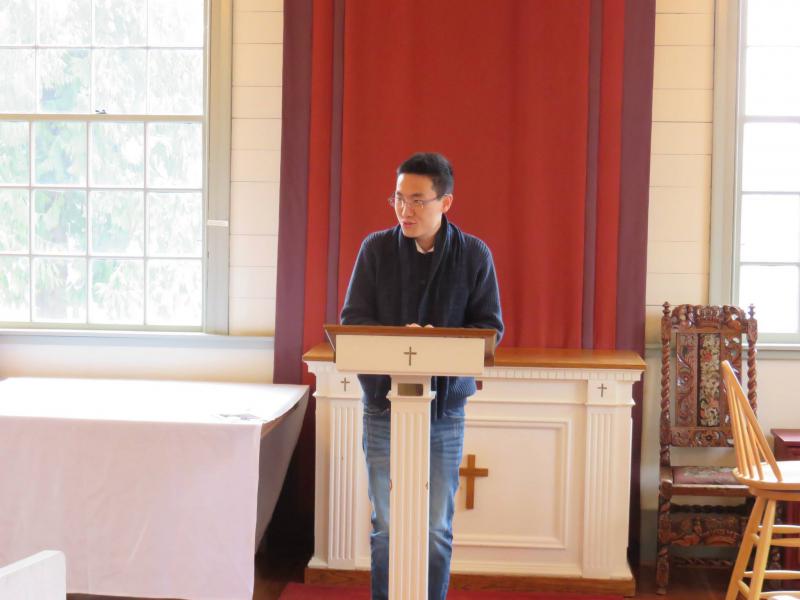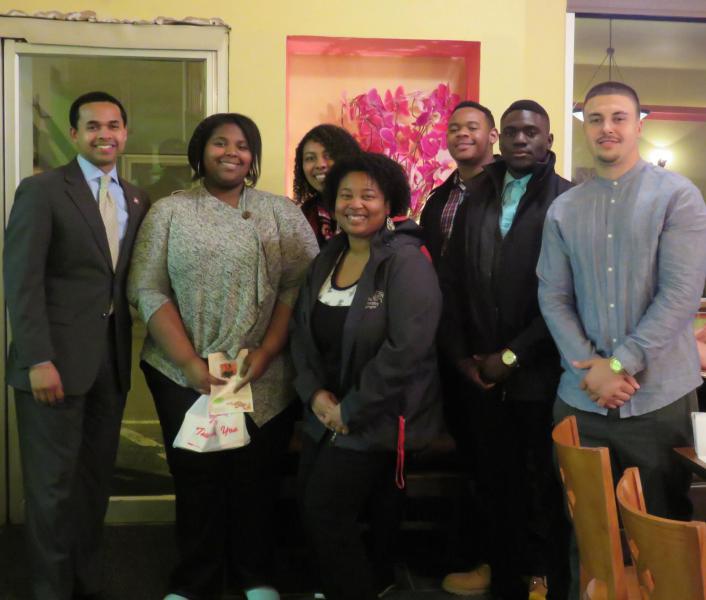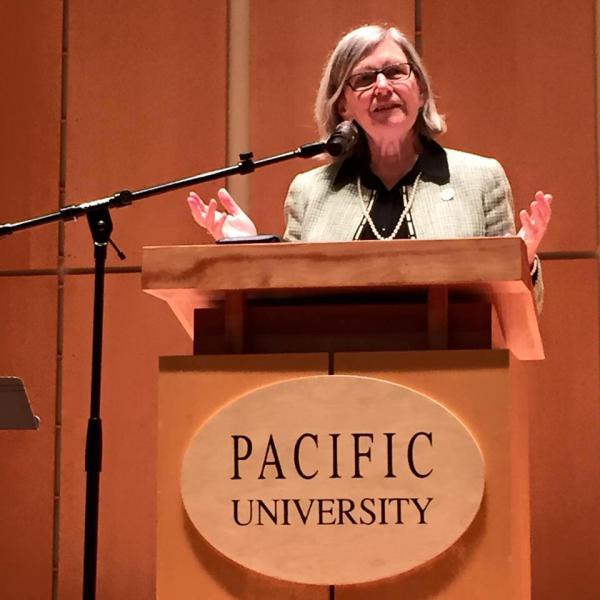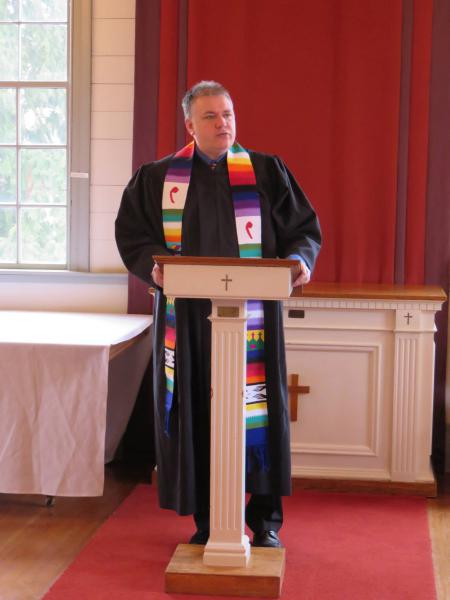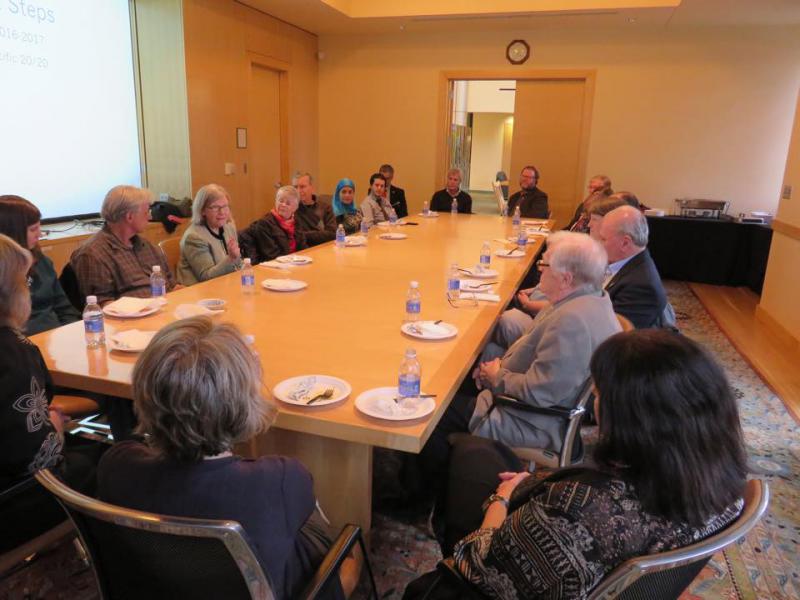2014-2015 Annual Report | Center for Peace & Spirituality
2014-2015 Annual Report for the Pacific University Center for Peace and Spirituality
The 2014-2015 academic year was one of change for the Pacific University Center for Peace and Spirituality (CPAS). Dr. David Boersema, the center’s founding director, returned to full-time teaching and the Rev. Chuck Currie began as the center’s director and university chaplain in August 2014.
CPAS’s core mission remained the same, however: “providing students with the opportunity to engage in meaningful study, reflection and action based on the recognition that inter- and intra-personal peace are inherently connected and that concerns for personal spirituality are intimately related to concerns for one's social, historical, cultural and natural environment.” This mission is in support of Pacific University’s overall mission to “inspire students to think, care, create, and pursue justice in our world.”
Working in collaboration with the Center for Civic Engagement, the Center for Gender Equity, the Tom McCall Center for Policy Innovation, and a variety of faculty, staff, students, alum and community partners, we sought to live out our mission this year in new ways while bringing fully to life the vision of CPAS becoming a regional center for peace and religious studies that university president Dr. Lesley Hallick and Dr. Boersema had when founding the center.
- Media Coverage: Reverend comes to Pacific in fall
- Media Coverage: Faces of Pacific: Currie returns to campus as chaplain
- Media Coverage: Chuck Currie seeks to bring religious conversation, not conversion, to Pacific University
- Media Coverage: Center for Peace and Spirituality: Director promotes speaker, student outreach
- Op-ed: Welcoming faith to Pacific University campus (guest opinion)
Study
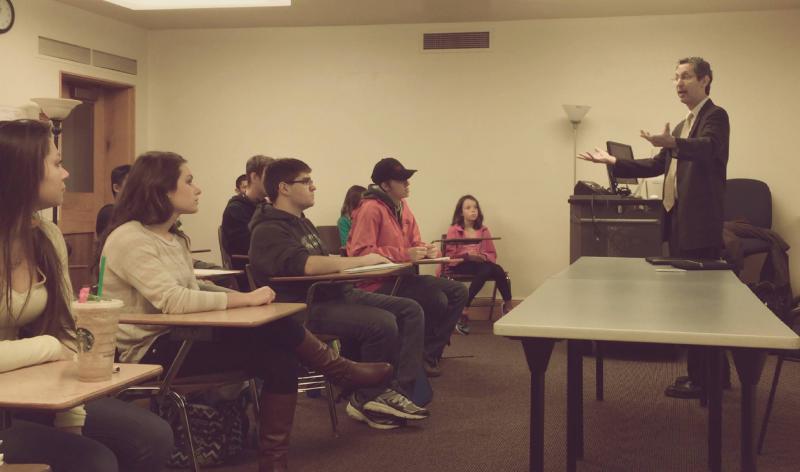
Rabbi Michael Cahana talks with Pacific students about Jewish life in America |
CPAS is where Pacific’s comparative religion and peace and social justice minors are housed within College of Arts and Sciences. Both minors offer classes important to the liberal arts and that further the mission of Pacific University. There is concern, however, within the College of Arts and Sciences that not enough students are taking either of these minors. Rev. Currie was tasked with undertaking a review of both minors and developing a proposal for how best to best provide educational opportunities for students in these areas.
Meetings with various faculty members and discussions with the registrar, along with students, showed high interest in both minors. When classes are offered in these two areas they are generally full.
Still, there is a lack of clarity among faculty and students as to whether or not enough classes are offered during a four-year period that would allow a student to earn enough credits for either minor. At best, a student would need to engage in creative scheduling to obtain the needed credits. There is also a feeling among faculty and administrators that not enough effort goes into “selling” either minor to students. It is also worth noting that the Peace and Social Justice Minor currently consists of classes more suited for a civic engagement minor.
In many ways, the subjects of religion, peace and social justice are intertwined. Classes in these areas are already sometimes cross-listed and more could be. Therefore, a proposal has been developed that the two current minors be merged into a new Religion, Peace & Social Justice Minor. A similar minor is currently being offered at Boston University. By merging the minors, Pacific would have enough available staff to offer enough classes over four years with available faculty and resources. The director of the Center for Peace and Spirituality would be charged with promoting the minor to students and serving as the advisor. This proposal has been reviewed by the Sociology, Anthropology and Social Work Department and is currently being re-written to reflect input from those faculty members.
Reflection
From Ferguson to Forest Grove
The start of Pacific’s academic school year coincided with the outbreak of racial tension across the United States following the death of a young African-American man in Ferguson, MO. man. A U.S. Department of Justice investigation would eventually find the Ferguson police department in violation of numerous civil rights laws. A national conversation on race began.
Working with the director of the Office of Diversity and the advisor to the Black Student Union, CPAS sponsored “From Ferguson To Forest Grove: A Forum Exploring The Intersection of Racism and Law Enforcement.” The forum, held Thursday, Aug. 28th in Taylor Auditorium, brought together students, faculty, civil rights activists, clergy, law enforcement and community members to reflect on the events in Ferguson and how our own lives are impacted by issues of race and racism.
- Media Coverage: In wake of Ferguson shooting, Pacific University forum looks at racism, law enforcement
- Media Coverage: At forum on Ferguson shooting, panelists at Pacific University call for change in criminal justice system
- Media Coverage: Racism at forefront of Pacific University forum
- Op-ed: From Ferguson to Forest Grove: Keeping hope alive for racial progress (guest opinion)
A Night In November
CPAS teamed up with Pacific’s Department of Theatre and Dance to host a special one-night performance of the play “A Night In November” on November 18th.
“Written by Marie Jones, A Night in November is the story of Kenneth McCallister, a rather ordinary middle class Protestant bureaucrat in Belfast. Sitting in the stands during a qualifying soccer match between the Republic of Ireland and Northern Ireland in Belfast in November 1993, Kenneth finds himself repelled by his brethren’s race hatred. When the Republic side wins, he decides to risk public disgrace and ostracism and travel to the World Cup in New York with Irish (Republic) fans.”
This was an excellent opportunity to expose students to the history of the “troubles” of Northern Ireland and how religious conflict has impacted Western society in the very recent past.
Grand Jury Forum
The Ferguson to Forest Grove Forum was a beginning. On Monday, November 24th, a decision was made not to indict the police offer involved in the Ferguson shooting. Protests erupted nationwide.
With the support of President Hallick, a message from Rev. Currie was sent to all students, faculty and staff urging that the grand jury decision be approached with “a level of humility” while suggesting that if those in the Pacific community “step back from the particulars of this one case and it becomes easier to see why there is so much distrust of the justice system from African-Americans, other people of color and allies.”
A forum was held the following day in Old College Hall to continue the discussion that began in August (and that had been continuing in both classrooms and dorm rooms ever since). The forum provided an opportunity for people to express concerns, frustrations and fears. Students who wanted ways to participate in protests where given information on how to do so non-violently.
Taking about race is never easy and there was a little push back from people on campus uncomfortable about the subject. One-on-one dialogue was established with students and faculty who brought forward concerns and for the most part common ground was found about the important need to find ways to address racism and concerns about the interactions people of color often have with law enforcement.
Martin Luther King, Jr. Day
|
Pacific student Minh Tran speaks at the MLK Interfaith Service |
The Martin Luther King, Jr. Day at Pacific provided yet another opportunity to reflect on race in America: both the great progress made since the Civil Rights Movement of the 1950s and 1960s and the problems still faced today.
CPAS hosted a new component to Pacific’s longstanding observance of the King holiday: a morning worship service. This service, held in the chapel in Old College Hall, was interfaith in nature and is widely believed to be the first interfaith service held in Pacific’s history. Readings from several faith traditions were shared. Pacific student Minh Tran offered a powerful message from the Buddhist tradition. Rev. Currie preached a homily, Unfilled Dreams, based on a sermon given by Dr. King. Unfilled Dreams was adopted as the theme for Pacific’s overall observance of the King holiday.
- Media Coverage: Pacific chaplain adds new feature to MLK Day menu
Action
International Day of Peace
September 21st has been set aside by the United Nations as International Day of Peace. The World Council of Churches has also declared the day as International Day of Prayer for Peace. CPAS engaged students, through social media, in several projects to mark the day. Students and other Pacific community members were encouraged to participate in a “media fast” to “avoid all violent television programs, movies, and video games” during that week. CPAS also promoted "Compassion, Genocide and the Other," a presentation on the Holocaust. Finally, Pacific community members were invited to share their hopes and prayers for peace on our Facebook page and on Twitter. Members of the Pacific Christian Fellowship even painted the “Spirit Bench” with messages of peace and the hashtag #PeaceDay that was being used on Twitter world-wide to promote International Day of Peace.
Social Justice Retreat
CPAS was a co-sponsor of a January weekend retreat for students interested in learning social justice leadership skills. Held January 23 to January 25, 2015 on the Oregon Coast, the retreat was designed to (a) examine structures of privilege (race, class, gender, sexuality, etc.) and their effect on our campus, (b) provide individuals with the skills to be effective allies and social justice leaders, and (c) provide students with the opportunity to discuss and identify ways to foster social justice on campus. Organized by a broad range of faculty and staff (Social Science Professors, Center for Civic Engagement, Center for Peace and Spirituality, Student Activities, and Alumni Relations) the retreat ultimately worked to create a community of diverse members from the Pacific University community that will be engaged in discussions throughout the year about social justice at Pacific.
National Service
|
Paul Monterio, far left, meets with members of the Pacific Black Students Union and their advisor Yashica Island (center) |
One of the keys to creating peaceable communities is service. In that spirit, CPAS invited Paul Monteiro, director of AmeriCorps VISTA and a former White House assistant to President Barack Obama, to the Forest Grove Campus on Monday, Feb. 2. Monteiro gave a public talk about the importance of national service at 7 p.m. in Taylor Auditorium.
Monteiro also spoke to Pacific classes during the day, as well as met with student members of the university's Center for Civic Engagement and had dinner with members of the Black Student Union. His visit was co-sponsored Pacific’s Center for Civic Engagement and the Tom McCall Center for Policy Innovation.
Before accepting the appointment to direct AmeriCorps VISTA, Monteiro served President Obama in the Office of Public Engagement at the White House. He was a liaison to many constituencies, including social safety net groups and faith communities across the United States. Monteiro worked for then-Senator Obama before joining Obama for America in 2007 as the deputy director for faith outreach. He is a graduate of Howard University School of Law and the University of Maryland.
- Media Coverage: Obama appointee pushes public service in Pacific talk
- Photos
Faith-based Action
|
Sister Simone Campbell speaks at Pacific University In April |
CPAS hosted “rock star nun” Sister Simone Campbell on Pacific's Forest Grove campus at the Taylor-Meade Performing Arts Center on Monday, April 6, 2015 for a public lecture. Her talk focused on the role faith can play in promoting public policies that advance the common good. Pacific's Center for Gender Equity played a key role in promoting the event.
Sister Simone has served as Executive Director of NETWORK: A National Catholic Social Justice Lobby since 2004. She is a religious leader, attorney and poet with extensive experience in public policy and advocacy for systematic change. In Washington, she lobbies on issues of peace building, immigration reform, healthcare and economic justice. Around the country, she is a noted speaker and educator on these public policy issues. Her latest book is A Nun On the Bus.
Sister Simone is widely known – featured on programs like 60 Minutes, The Colbert Report, The Daily Show with Jon Stewart – and her visit was greeted with excitement.
In addition to her public lecture, Sister Simone visited Pacific’s Woodburn campus to talk about education and immigration reform. Members of CPAS’ new advisory committee, along with faculty and staff, also joined Sister Simone for dinner.
- Media Coverage: 4 universal tips for changing the world from the 'nun on the bus,' Sister Simone Campbell
- Media Coverage: Rock-star nun talks Jesus, justice in Forest Grove
- Media Coverage: Nun on the Bus visits campus, brings insight to social issues
- Photos
University Chaplain
|
Rev. Chuck Currie |
As director of CPAS, Rev. Currie also holds the new position of University Chaplain. This is the first time in around thirty years that Pacific has had such a position on campus. A great deal of time and discussion went into developing the scope of services the University Chaplain would provide – and how to provide those services in a pluralistic, interfaith environment.
What ways can the University Chaplain assist members of the Pacific community in their spiritual development?
- The University Chaplain is available to assist students and others in finding places of worship
- The University Chaplain is available to provide support to student faith groups on campus to further the mission of the University
- The University Chaplain is available to provide short-term pastoral care to students and other Pacific community members as requested. At Pacific University we define pastoral care in these terms:
“Pastoral care, which can be defined simply as ‘companioning another’s spirit,’ offers a way to tend to the well-being of our innermost selves. Rather than provide solutions, Pacific’s ministry of pastoral care is here to walk with you during your time of need, listen deeply to your concerns and help you reconnect to your spirit and to a sense of wholeness. Pastoral care may include hospital and in-home visits, short-term pastoral counseling, telephone calls, sending cards, delivering a meal, or other activities as deemed appropriate by Pacific’s University Chaplain. Students in need of mental health counseling should consult with the Student Counseling Center or ask the University Chaplain for a referral. Pastoral care is not professional counseling.” (Adapted from Eliot Chapel)
The University Chaplain is also available to
- Provide prayers at University occasions as requested
- Conduct weddings, memorials and funerals as requested for members of the University community
- Officiate and coordinate special worship services
CPAS Advisory Committee
|
CPAS advisory committee members join Pacific leaders and community members at a dinner with Sister Simone Campbell |
A new advisory committee of community partners, religious leaders, peace advocates and Pacific faculty was formed in 2015. Members will provide input and advice on CPAS’ activities and direction. We are actively looking for students to serve on the advisory committee and are recruiting representatives from other faith traditions.
Members
Loren Waltz and Dottie Waltz, founders of the Waltz Endowment for the Pacific Center for Peace and Spirituality
Dr. James Huntzicker, Head, Division of Management, School of Medicine, Oregon Health Sciences University
Rev. Dr. Walter John Boris, conference minister, Central Pacific Conference, United Church of Christ (daughter went to Pacific)
Dr. Russ Dondero, professor emeritus, Pacific University
David Leslie, executive director, Ecumenical Ministries of Oregon
Rev. Kate Lore, social justice minister, First Unitarian Church
Wajdi Said, president and co-founder, Muslim Educational Trust
Rev. Dr. T. Allen Bethel, senior pastor, Maranatha Church and President of the Albina Ministerial Alliance
Dr. Dave Boersema, founding director, Center for Peace and Spirituality
Dr. Stephanie Stokamer, director, Center for Civic Engagement
Dr. Martha Rampton, director, Center for Gender Equity
Dr. Jim Moore, director, Tom McCall Center for Policy Innovation
U.S. Rep. Les AuCoin (retired), Pacific alum (honorary chair of the Advisory board)
Social Media
This year, for the first time, CPAS entered the age of social media with a Facebook page and Twitter account.
Social media is used to promote university-wide events, promote religious understanding (religious holidays and noted and explained on the accounts) and to draw attention to what is happening both locally and across the globe that impacts the cause of peace and our appreciation for diverse spiritual traditions. The CPAS Facebook page has quickly become one of Pacific’s most popular social media platforms.
Waltz Endowment for the Center for Peace and Spirituality (CPAS) at Pacific University
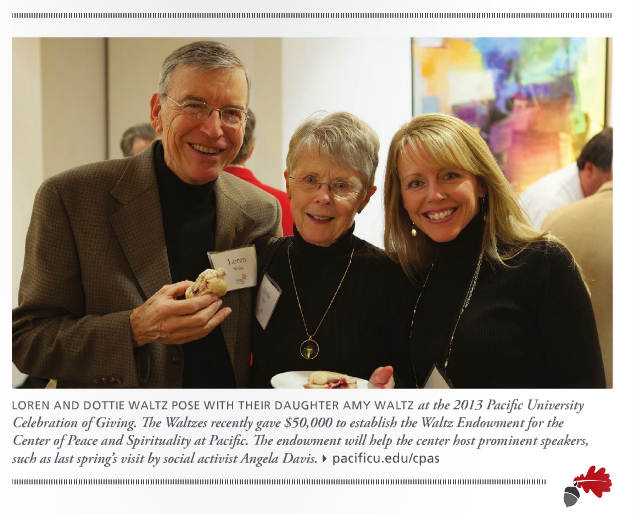
This year also brought exciting news of a $50,000 gift to establish the Waltz Endowment for the Center for Peace and Spirituality (CPAS) at Pacific University. Funding from the endowment helps to cover expenses for bringing speakers to Pacific and the overall operations of CPAS. You can make a gift to CPAS by talking with the university’s development office (online giving is available).



